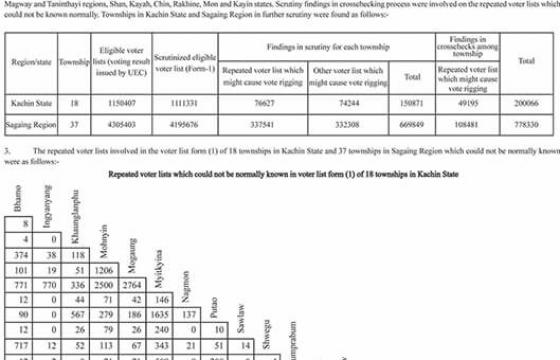The 25 October refugee repatriation, involving some seventy refugees, who left Thailand’s Tham Hin and Nu Po camps to return home voluntarily to Yangon (Rangoon), Tanintharyi (Tenasserim) region, Kayin (Karen), Bago, Mon and Rakhine (Arakan) states, is supposed to be a pilot project for further follow up of wider undertakings to resolve the refugee problems that have plagued the country for decades.
While some lessons from such a project could definitely be drawn, it is not clear if such similar undertakings would follow suit anytime soon for some 103,000 refugees spread over nine camps along the Thai-Burma border for more than two decades, given the still unclear to negative feedback regarding the returnees in terms of the recent resettlement experience and more importantly, the failure to instill the peaceful atmosphere on the ground, in most ethnic states and the country over.
Although this United Nations High Commissioner for Refugee (UNHCR) first voluntary repatriation of Burma’s refugees from Thailand is definitely aimed as a pilot project and partly, the eagerness of the stakeholders concerned to pull it through for whatever reason they might have in store, even under unfavorable condition, an UNHCR official was careful in his statement not to sound overly optimistic, regarding the issue.
“ This particular movement is a milestone but it won’t be the start of a large exodus,” Iain Hall, UNHCR’s senior field coordinator, told Reuters.
Rumors have surfaced that the Thai government plans to close down the camps but Hall dismissed this claim.
“We’re not promoting return and we’ve made that clear with both governments,” said Hall. “We don’t yet believe it is the time to return but of course these people have the right to return if they want to.”
Feedback and situation on the ground
Of the nine refugee camps along the Thai-Burma border that house around 103,000 refugees and internally displaced persons, more than 80,000 are ethnic Karen, with a mixture of Mon, Tavoyan or Dawei, Karenni and Shan, from eastern Burma who fled violence and persecution while the country was under military rule.
While most of the refugees will be resettled in various towns within Karen State, according to the state’s Chief Minister Nang Khin Htwe Myint, some would also go to Mon State, Arakan State, Tenasserim and Rangoon Regions.
Feedback on how the returnees are fairing after their return is still scant at this writing, but some resettlement problems regarding resettlement in ethnic states are just beginning to surface, including also the housing difficulties of the Rangoon returnees.
According to local media, seventeen refugees who returned recently to Burma from Thailand are stuck in a state-run shelter in Rangoon because the government has so far failed to arrange housing for them.
Reportedly, government officials have encouraged the four families to buy low-cost housing in Hlaing Tharyar Township, but so far they have refused.
Daw Khin San Yi, 59, a former political prisoner and refugee who returned from Nu Po camp in Tak province, told The Myanmar Times: “We lived with difficulties in Thailand. We are not rich people and we have no money to pay for low-cost housing. I don’t understand why the government arranged that.”
She added that she and her husband returned from the Nu Po refugee camp, where they were sheltered since 2010, as they heard that the National League for Democracy-led government would fully support their repatriation.
“We chose to return to Myanmar but I think we made a mistake. I thought the government had already arranged our accommodation,” she said.
Again, although not directly concerned with the recent repatriation, the Internally Displaced Persons (IDPs) in Tanintharyi Region told a press conference in Rangoon according to the Myanmar Times quite recently, that they thought their problems were finally over when the ceasefire between the military and ethnic armed groups was finally signed in October last year, allowing them to return to their ancestral homesteads.
But they discovered that their problems were just beginning, when four villagers from Kyayzuetaw village, Yephyu township, have been slapped with lawsuits by Shwe Padonmar Production Enterprise, and two villagers from Band Mae village, Myeik district, are being sued by the Asia World company amid accusations that some villagers destroyed palm oil trees.
The villagers, who left in the 1990s, due to the fighting between the KNU and the military, returned twenty years later, as the regional minister for Karen affairs has told them to do so, only to find out that certain companies were granted permission by the government to set up palm oil plantation projects in their villages, according to Naw Pe Tha Law of the Tanintharyi Friends civil society group.
Karen Refugee Committee (KRC)
Regarding the recent refugee repatriation undertaking, this writer has inquired a prominent Karen National Union (KNU) functionary, David Tharckabaw on his take, in which he replied: “The KNU’s stated policy has been the return of the refugees should be done only after there are stable peace and democracy in the country. This pilot project is done by some of our own officials and foreign NGO persons who would gain benefit from the refugee return.”
According to him the KRC’s ten point refugee repatriation statement issued is also still the KNU policy today.
The Karen News of 26 March 2013 posted the KRC’s ten key point statement that had to be met in order for a repatriation process to be put in place that did not undermine the lives of refugees.
KRC’s ten key points are:
- Nationwide ceasefire should be observed;
- There should be sustainable peace and political conflicts should be settled;
- Provision of universal human rights must be respected;
- Relocated areas should be freed from land mines and security should be given a priority;
- The relocated areas should be suitable for one to support their livelihood; favorable land should be provided adequately for one’s family;
- Health certificates, education certificates received should be recognized by the government;
- We will not tolerate force repatriation; it should be one’s own decision or voluntary return;
- Adequate preparation should be given to return;
- Right should be given to the Committee concerned regarding repatriation and allow them to inspect location and collect necessary information;
- The repatriation can only take place when the concerned organizations, KRC, INGOs, NGOs, UNHCR, and CBOs (Civilian-Based Organizations) agree that there is a genuine peace in Burma.
UNHCR strategic roadmap
In the same vein, the UNHCR’s “Strategic Roadmap for Voluntary Repatriation” also outlined the similar conditions for the possible return of the refugees on a large scale.
Accordingly, promotion of voluntary repatriation will be initiated by UNHCR only when conditions of legal, material and physical safety throughout South-East Burma are conducive to return for the vast majority of refugees.
In particular, it is envisaged that the following benchmarks should be met:
- A Nationwide Ceasefire Agreement or other durable ceasefire agreements are in place;
- UNHCR has unhindered access to most of the return areas and is able to conduct protection monitoring, including through confidential interviews with returnees and receiving communities;
- An effective framework for mine action at the regional or national level is in place; in particular, a system throughout the South-East for demarcation of return routes and locations, and mine risk education (MRE);
- Plans for free and fair elections remain on track, or more likely the vote has been completed, with a political transition underway (This benchmark penned in 2015 before the election was partly fulfilled, with NLD being able to form the government in March 2016, although the military’s formidable clutch on political power remains in tact, made necessary by the 2008 military-drafted constitution);
- A tripartite agreement for return is in place which clearly re-establishes national protection for returnees.
Accordingly, UNHCR employs the following definitions in relation to its repatriation categories.
- Spontaneous returns, which are already taking place, are organized by the refugees themselves, without UNHCR’s direct knowledge or support before or during the movement.
- Facilitated returns actively involve UNHCR both through the provision of information prior to departure, possible assistance to Persons with Specific Needs (PSNs) during the voluntary return movement, and assistance upon return, with such engagement contingent upon an assessment of the conditions in a specific location.
- Promoted returns involve extensive UNHCR support, including support for transportation and the entitlement to a package of reintegration assistance, once the conditions are appropriate for the promotion of return throughout South-East Myanmar. (Source: United Nations High Commissioner for Refugees, “Strategic Roadmap for Voluntary Repatriation”, Refugees from Myanmar in Thailand 2015-2017, Update – March 2015)
Core problems and perspective
Aside from the negative feedback of the recent, facilitated, repatriation pilot project, lack of real ceasefire on the ground and problems stemming from unjustified land confiscation and distribution would be the two toughest challenges that the government has to overcome.
The KRC and as well as the UNHCR have outlined these common issues which are essential to the successful repatriation of the refugees.
The nine refugee camps in Thailand are mostly inhabited by the Karen, with a mixture of Karenni, Mon, Tavoyan and Shan, among others. And the military situation in the mentioned, affected states could be termed as a mixture of tranquil and conflict zones.
For example in Karen State the conflict between the DKBA splinter group, which calls itself the Democratic Karen Buddhist Army, and the Karen Border Guard Force (KBGF), that is under the wing of Burma Army with Burmese military officials involved, have pushed some four to five thousands of IDPs and refugees fleeing to inland sanctuaries like Myaing Gyi Ngu and to the Thai side of the border some two months ago.
Reportedly, as recently as of 20 October, there has been a clash between the DKBA splinter group and a joint force of Burma Army and KBFG.
“ During the attack, four of our soldiers died,” Maj Saw San Aung, a leader of the DKBA splinter group told The Irrawaddy on 20 October. “The fighting lasted over 30 minutes and we heard that one civilian was injured.”
The Karenni National Progressive Party (KNPP) and New Mon State Party (NMSP) are non-signatories to the Nationwide Ceasefire Agreement (NCA) and thus are militarily prone to attacks if the Burma Army chooses to do so.
Even the NCA signatory’s Restoration Council of Shan State (RCSS) drugs rehabilitation center and its other various military camps were attacked last month by Burma Army with the pretext of RCSS recruiting new troops.
The Union-level Ceasefire Joint Monitoring Committee (JMC-U) is said to be investigating the fighting that has now already died down, even though it could restart any time depending on the mood of the Burma Army.
The KNU, the signatory of the NCA has no military engagement with the Burma Army starting 2011, except for some small accidental clashes. But the clashes between the DKBA splinter group and KBGF, sometimes in collaboration with the Burma Army, have irked the KNU, as the Karen BGF intruded into its areas of control and even asked permission for its troops to be stationed permanently, which were refused.
Other than that the KNU congress that is about to be held, even though rumors about postponement for one year, due to the wish of Chairman Mutu Say Poe, is said to be in discussion.
Many knowledgeable Karen watchers have not ruled out that Mutu’s faction could be voted out, due what many believe to be his appeasement posture vis a vis the Burma Army, and a hardliner faction headed by Naw Zipporah Sein, Vice- President of KNU, could replace him.
According to insider Karen sources, there has been unclear speculation regarding the last KNU congress election, which has ushered Mutu in as a Chairman of the KNU.
Reportedly, when the former Vice-President David Tharkabaw was not reelected, a proposal to recount the votes was made, but unable to carry out as the voting ballots were already burned. The controversial surrounding the election results were never able to be cleared, which might have resulted in little or no backing from Karen diaspora, political parties and Civil Society Organizations for Mutu headed KNU leadership.
If this happens, the KNU might rejoin the United Nationalities Federal Council (UNFC) and the whole military equation could change. This could either be unleashing another heightened military offensive by the Burma Army or coming to the negotiation table with renewed enthusiastic positive attitude, as it might seem fighting a long drawn out war would only lead to the continued destruction of the country without end and the denial of development and reconciliation, which the country could ill afford.
Apart from that, within the context of the whole country, the armed conflict in the North and Northern-eastern part involving the Kachin, Shan, Palaung and Kokang EAOs are still ongoing, where some 100,000 IDPs and refugees are still unable to go home.
To sum up, the war in Karen State is not as wide spread for now, but could escalate depending on the KNU power struggle and political development. The armed conflicts in Shan and Kachin States are ongoing and could heightened anytime, if the military chooses to do so.
Besides all these debacles, another social side-effect might be brewing that could become a headache and problematic issue in the future, as Time has pointed out in its report on 27 October.
“ Nearly half the Burma refugees in Thailand are under the age of 18. It’s bad enough to be forced to become a refugee; it’s almost as bad to be forced to return to a homeland you’ve never known—a refugee in everything but name only,” the Time report said.
Given such circumstances, the possibility of of a mass refugee repatriation, or promoted returns involving extensive UNHCR support, for the South-eastern and as well, the North and North-eastern part of the country, is dependent on a comprehensive end to conflict, a normalization of state-society relations, and the emergence of a legitimate and functioning state. And as such, the trial and error refugee repatriation pilot project of the UNHCR won’t lead us anywhere to the durable solution, but only the holistic political settlement approach that would enable to end this decades-old, simmering, refugee crisis, linked to all the woes encompassing the country, would resolve the problems.






